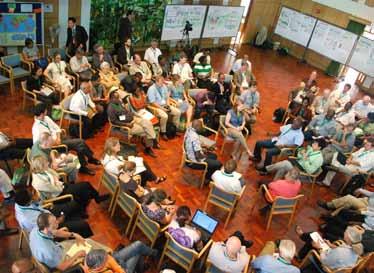
1 minute read
EcoAgriculture: An Innovation That Restores Landscapes
from Land for Life
CoSta riCa
The new land rush, popularly known as the “land grab,” the recent food crises, and the recurrent resource-based conflicts simmering in many regions all signal that productive land is in short supply. Not surprisingly, the advocates for food security and biodiversity conservation are vying to advance their agendas in the same critical regions of the world.
Advertisement
EcoAgriculture Partners is built on the idea that meeting societal needs will require pursuing strategies that address these competing demands simultaneously. Its strategies are designed to manage landscapes so that they can produce food, conserve ecosystem services and biodiversity, and improve the well-being of residents. The desire of EcoAgriculture Partners is to create a world where agricultural communities manage their landscapes so that they can simultaneously enhance rural livelihoods, conserve biodiversity and ecosystem services, and produce crops, livestock, fish, and fiber sustainably.
EcoAgriculture launched the Landscapes for People, Food, and Nature Initiative to break down the silo or tunnel vision that was blocking collaboration among the many different organizations and stakeholders working on these issues. The approach begins with seeking to understand the system itself—the first step is to map the movement of water, nutrients and wild species through landscapes, observing how they interact with crops and livestock production. In the process, EcoAgriculture identifies opportunities to modify farming practices or other land uses to minimize the trade-offs and take full advantage of the synergies between agriculture and biodiversity conservation. Scaling this work is critical; over 2 billion hectares of land could potentially be restored and there are growing calls, on the global level, to adopt a landscape approach to their restoration.
EcoAgriculture has developed the tools to assess, plan, negotiate and design the interventions, and to track the changes that result. Experience has also taught EcoAgriculture that having strong leadership is the single greatest factor for success in scaling up integrated landscape management. They build this human capacity by training, supporting, and networking leaders at the grassroots level.
EcoAgriculture has given advisory and technical support to dozens of landscape initiatives in countries such as Costa Rica, Ethiopia, India, Kenya, Nepal, Rwanda, Tanzania, Uganda, and the United States. EcoAgriculture Partners and the Landscapes for People, Food, and Nature Initiative have tremendous potential for replication on a wide scale across Sub-Saharan Africa, Asia, and Latin America.
Web site: www.ecoagriculture. org










